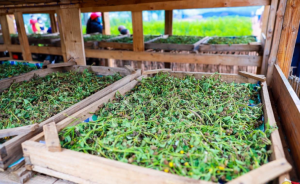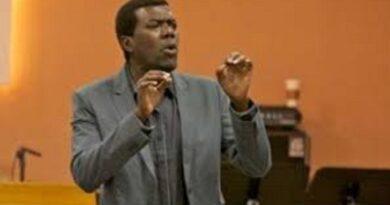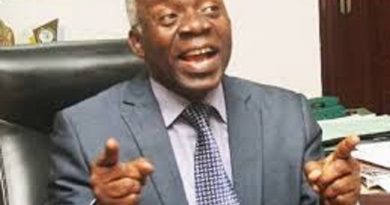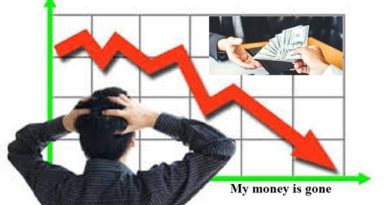COVID-19 Cure: Blame Our Brainwashed Leaders For Non-Promotion Of Nigerian Native Remedies Says Rev. Fr. Adodo
Rev. Father Anselm Gbenga Adodo has blamed Nigerian leaders for not promoting our native remedies towards eradicating the coronavirus.
The Clergyman is a scholar and a pioneer of alternative medicine in Africa. He is also a Benedictine monk and priest of the Roman Catholic Church in Edo State.
He founded Nigeria’s first alternative medicine and research laboratory enterprise in Nigeria known as Pax Herbal Clinic and Research Laboratories in Ewu, Edo State in 1997.
Recently he was in the news after announcing that the Catholic Church Centre had discovered a clinical herbal drug for the treatment of COVID-19. Adodo, in this interview, speaks on the activities of Pax Herbal Centre and its efforts to commence mass production of the treatment drug for COVID-19 as soon as approval is received.
Pax Herbal is a well-known brand. How did you receive the vision to commence operations?
Pax Herbal Clinic & Research Laboratories is a Catholic Centre for scientific identification, cultivation, development and promotion of African herbal medicine. It is not my personal project. It is a project of the Benedictine Monks of Ewu, Edo State.
The monastery was founded in 1979. It is, however, true that I initiated it, along with Fr. Vincent Mordi of blessed memory and Brother Michael, who is currently the overall manager. There are more than 15 other monks working hard to keep things going here. I often make jest of them that they are doing the work while I am getting the credit. We have over 100 full-time workers, comprising microbiologists, biochemists, natural plants chemists, pharmacognosists and Plant biotechnologists.
Over 50 science students from eight universities undergo industrial training in our centre yearly. Let me tell you the truth: The standard and level of research here in our Centre is far more than people even know. When an American Ambassador visited the Pax Herbal Centre some years ago, she was surprised that such a place exists in Nigeria and wondered why the Nigerian press has not been talking about it. So, as you can see, it is not just about my vision. It is the spirit of St. Benedict urging us on.
What formal and informal training did you acquaint yourself with before opening the Herbal Research Centre?
Formally, I am trained as a philosopher and a theologian. I also studied ethnobotany, ethnography and anthropology. My doctoral degrees are in management of technology and innovation and medical sociology. Informally, I am a farmer, drummer, poet and a wrestler.
Going through your array of products, would it be right to say you have drugs for most ailments plaguing Africans? If true, can we know some of these drugs and the ailments they cure?
We have herbal medicines for many of the diseases that plague our people. For more than 25 years, we have been producing herbal medicines for diabetes, hypertension, asthma, malaria, prostrate problems, male and female infertility among others. For those 25 years, we have strived to maintain the same high standard and consistency. The only thing we are poor at is making noise about what we do. Those who use the products make the noise for us.
Since your drugs are mostly herbal in nature, how do you subject them to scientific appraisal for certification by NAFDAC?
NAFDAC does not certify whether a herbal product is efficacious or not. All they do is to screen your product and subject it to safety tests, after which they will give you a listing number. The listing number simply means that the product is safe for human consumption and can be sold to the public. That is why all NAFDAC approved herbal products bear a disclaimer, to notify the user that the claims in the product have not been verified by them. Verification requires clinical trials which takes many years and very expansive.
What are some of the operational challenges confronting you over the years and how have you gone about surmounting them?
In Nigeria, it is easier and cheaper to be an importer and seller than to be a manufacturer. The challenges are part of the Nigerian system: weak infrastructure, poor road network and lack of electricity.
Electricity is an excessively big issue for us, because we have laboratories where interrupted electricity is vital. For instance, we bought an incubator from China some years ago. Each time it developed a fault, we were required to order for the faulty parts from China. So we decided to dismantle the incubator and see what was inside.
We were surprised that it was just ceiling fan and some elements to generate heat, and a temperature controller. Since then we have been constructing most of our machines. We construct plant driers, conveyors, heaters and incubators. Most challenges are, for us, opportunities for growth. But there are other challenges that require external support, like the issue of further expansions to increase production capacity.
We have always been told that virus have no cure. How true is this?
Those who specialize in the study of viruses are virologists. It is a special field of study. Viruses have always been with us. Because they easily mutate and self-replicate, they are difficult to target for extermination. Regarding the issue of cure, at the end of the day, the body’s immune system is the real doctor.
HIV is one of the most prominent viruses known to man. Does it have any known herbal cure?
We have been managing people who have HIV, hepatitis B and tuberculosis for over 25 years. We have kept accurate records of the people treated. As you know, HIV has the problem of stigmatization, so it is a sensitive topic to discuss. I can count, at least, 150 people with very high viral load who came to us for treatment 20 years ago and who are still alive and well and active, and I know they are not using any western drug.
Recently, you announced you have discovered a cure for COVID-19 with a team of medical experts. Can you please shed more light on this?
What we said was that we have formulated herbal medicine with a potential to treat COVID-19. People will then ask if you have treated anyone with it and how did you know it cures. There are procedures for drug formulation and application. You can easily test the efficacy of a drug first in animals to ascertain safety and also to develop the therapeutic dosage.
We have done all those, and that is why we work with virologists, immunologists, parasitologists, clinical pharmacologists, pharmacognosists and many others. Coronavirus is not new to us. SARS (severe acute respiratory syndrome) is also a coronavirus. Recently we had the EBOLA outbreak. COVID-19 is a less severe kind of coronavirus. Why it is shaking the world this way is strange indeed!
Many people are claiming to have found a treatment but WHO seems not to be showing enough interest in these claims. Why?

My opinion is that every country should look inwards to find solution to their problems. They do not need WHO’s validation. I still find it difficult to understand why African countries are always looking to international agencies to validate everything they do, in economics, agriculture, politics and health. Have you ever seen the EU or USA waiting to get validation from African countries on any topic? That is why I like what is happening in Madagascar. They said they have discovered a cure, based on their own knowledge and validation system. And they are making use of what they have discovered. Maybe it’s not a perfect cure. But why do they need WHO to validate their contextual solution? Rather than blame WHO, I prefer to blame our brainwashed local leaders.
WHO claims only a vaccine can stop the virus. Do you ascribe to this?
Well, that sounds more like a dogmatic statement rather than a scientific statement. If WHO said that then they need to open a theological unit in their headquarters. If some people in certain parts of the world want synthetic vaccine, they should have it. If some other people in other parts of the world prefer to have an oral vaccine, they should be allowed to have it. If they prefer phytomedicine instead of vaccine, so be it. From what I hear and see, majority of Africans prefer the latter. I hope WHO will respect their wish.
There are fears in some quarters that using vaccines to contain the virus might have some sinister religious and scientific implications. What is your take?
The mess in which inhumanity finds itself today was caused by a wrong understanding of knowledge and its role in human development. Firstly, we were led astray by the myth that with enough knowledge and technology (computers, digital machines, satellites, buttons, etc), we can rule the earth and control it. But the complexity of the earth and its life systems can never be safely managed.
We can never master the complex functioning of atoms, protons, eons, viruses and electricity. I hope that our scientists, politicians and the world in general will learn from this experience of COVID-19. As Pope Francis warns us in his encyclical, GAUDATO SI, we should ask ourselves if this is the kind of world we want to bequeath to our children, a world of crass individualism and limitless greed. My take is that COVID-19 is not just a health issue. It also has a spiritual message for us.
Now that you have discovered a cure, what next?
Once the drug gets the approval of NAFDAC, we will make it available to the public. But we will proceed with further research to isolate the active compounds and enclose them in soft gels. This will increase the efficacy.
Should you get the green light from Federal Government to commence mass production, how would you go about it?
It is not a matter of if, it is when which should not be beyond June. To go into mass production, we will need bigger workshops, capsulation machines and full automation of our production process. We will do only what we can do and hope for the best until help comes.
Some experts have warned that the virus will always be with us. Do you believe it is man-made?
As I said, viruses have always been with us. They always remind us not to take our immune system for granted.
How soon should we expect to see this drug in our local pharmacies and how affordable would it be?
We are working towards June 2020. All our products range between N500 and N1500.
Do you have any plan to partner with WHO and other foreign agencies on this your findings?
Our focus is Nigeria and Africa. This is our home. If WHO wants to come here we will welcome them. In order to be global, one must first be local.
What’s your next step of action towards making the drugs available across the country?
We have our sales outlets in many Catholic parishes across Nigeria, especially in Lagos. We encourage Catholic parishes to open outlets in their parishes. It is an important service for the people.
Of recent your supply chain has been somehow slowed down. How do you intend to improve on this?
Yes, the cost of production was going too high, and we did not want to raise prices. So, we just have to find a way to keep going.
How much of support have you been getting from the Catholic Bishops Conference of Nigeria, CBCN and fellow priests?
A good thing will sell itself. I think the Pax Herbal brand is very good and well trusted, and this has promoted trust among the people. The CBCN and the clergy will continue to support us so long as we make the Church proud.
QUOTE: To go into mass production, we will need bigger workshops, capsulation machines and full automation of our production process




